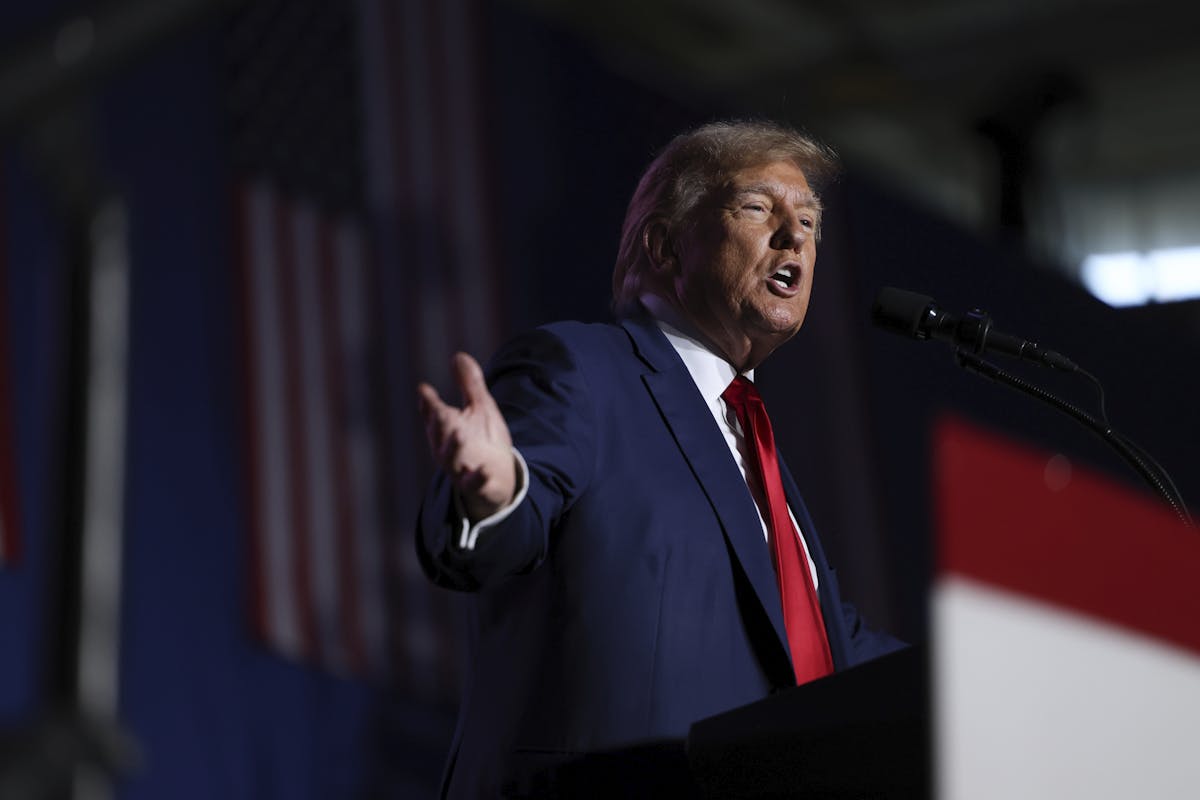Trump Denies Being an Insurrectionist as He Turns to Supreme Court To Shield Himself From Disqualification
The push to use the Constitution to disqualify the 45th president from retaking the White House could soon come to a head at the nation’s highest court.

President Trump’s petition for the Supreme Court — three of whose number he named to the high bench — to keep him on the primary ballot in Colorado doubles as an invitation for the justices to cut to the constitutional quick.
The petition comes after a fractured Colorado Supreme Court ruled — four to three — that Mr. Trump was disqualified under Section Three of the 14th Amendment from appearing on the state’s primary ballot. That clause bars from office those who swear an oath to the Constitution and then “engage in an insurrection or rebellion.”
That ruling, though, alongside one in Maine, is stayed pending word from the high court. Before the decisions out of Maine and Colorado, no presidential candidate had ever been booted from the ballot on the basis of the 14th Amendment. Now comes Mr. Trump to decry its use against the “leading candidate for the Republican Party nomination for President of the United States.”
Mr. Trump quotes President Lincoln at Gettysburg — America is ruled by a “government of the people, by the people, [and] for the people” — for the conclusion that “Colorado’s ruling is not and cannot be correct. ” If the Rocky Mountain ruling is undisturbed, he warns, it will “unconstitutionally disenfranchise millions of voters in Colorado and likely be used as a template to disenfranchise tens of millions of voters nationwide.”
The 45th president contends that “Congress, not a state court, is the proper body to resolve questions concerning a presidential candidate’s eligibility.” He calls it “beyond absurd” that a “national matter with national implications” — the election of a president — could rest in the hands of state jurists. Even federal ones, he argues, “lack judicially manageable standards for resolving disputes over presidential disqualifications.”
Mr. Trump argues that the office of the president is not contemplated by the 14th Amendment, which bars insurrectionists from holding “any office, civil or military, under the UnitedStates, or under any State.” The president is not explicitly mentioned, and Mr. Trump questions the persuasiveness of burying the “most visible and prominent national office in a catch-all term.” He also makes a grander constitutional point — that the president is not an “officer of the United States,” as required by the clause.
It was on that basis that a Colorado district court judge, Sarah Wallace, ruled that Mr. Trump could not be disqualified. The Appointments, Commissions, and Impeachment Clauses of the Constitution all appear to conceive of the president as separate from those called “officers.” The chief executive also takes a different oath of office than other officials. He swears to “preserve, protect and defend the Constitution of the United States.”
The sine qua non, though, of disqualification is “insurrection.” Mr. Trump claims that in the “context of the history of violent American political protests, January 6 was not an insurrection.” Citing the Civil War, Mr. Trump proposes this definition — the “taking up of arms and waging war upon” America. He analogizes January 6 not to the War Between the States but to the assault on the federal courthouse at Portland in the summer of 2020.
Such dispute over definitions could be one clue toward explaining why no January 6 defendant has been charged with insurrection. That includes Mr. Trump, who faces a range of criminal charges in respect of the events at the Capitol, none of them insurrection. He was acquitted of that charge, by the Senate, during impeachment proceedings. Elsewhere, in his criminal case, he argues that such a verdict precludes further prosecution on double jeopardy grounds.
It is possible that the Department of Justice decided against using the insurrection charge because it feared that it would eventually come before the Nine, as it has now. By constructing cases that do not rely on an insurrection having occurred, prosecutors have insulated themselves from a ruling that it did not. That caution, though, could weaken this disqualification case.
Even if there were an insurrection, Mr. Trump writes to the justices, he “never told his supporters to enter the Capitol, either in his speech at the Ellipse or in any of his statements or communications before or during the events at the Capitol.” The brief, though, does not mention that Mr. Trump did tell his supporters to “fight like hell.”

